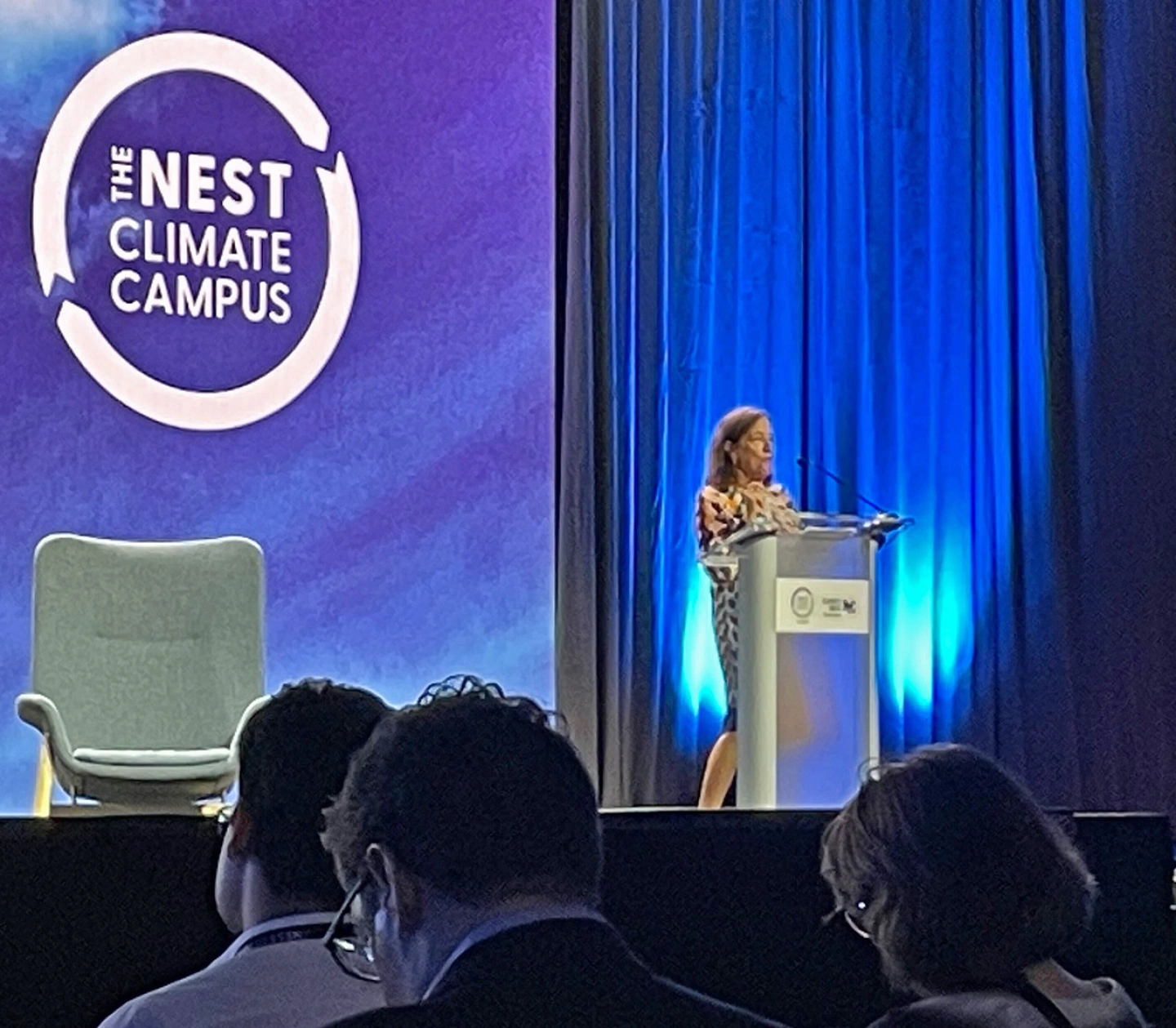Good morning. Thank you so much for joining us here at the beautiful Nest Climate Campus.
I’m Mindy Lubber, and I am the president and CEO of Ceres, a nonprofit organization that for more than 35 years has worked to integrate sustainability into capital markets.
We have been working to help investors and companies responsibly manage the financial, business, and economic risks of the world’s greatest sustainability challenges for more than 35 years.
When you think about climate change, nature loss, water scarcity and pollution – they all pose incalculable risks to capital markets, as well as unlimited opportunity.
In my short 5 minutes, I want to talk about some of those risks, the opportunities, and some of the headwinds that we are facing, where we need all of you to join us in pushing back.
Here in 2025, we find ourselves at an interesting moment for these ideas.
So let’s start with the risks. The risks have never been so clear. From water shortages to heatwaves to insurance markets, we are seeing the multi-billion dollar impacts of climate change each day.
In the US we’ve seen $182 billion in economic damages in 2024, and we’ve already seen $93 billion in 2025. The risks couldn’t be clearer. And the opportunities, as well, have never been so clear.
Globally, clean energy and grid investments are projected to reach $2.2 trillion in 2025 – twice the amount expected to flow into fossil fuels. And in the last five years, clean energy investments have more than doubled.
I can keep going on the opportunities. They are clear, they are there.
We will hear from Tony Davis, a brilliant investor, shortly on the opportunities. But that’s what we are seeing. For capital markets, there is so much moving forward.
But there are also now headwinds that we’re going to talk about in our next panel. That’s making it a little more difficult for private sector leaders to move.
So first let me talk about the response, and then I’ll talk about the headwinds.
We’re seeing headwinds suggesting that acting on climate is a breach of fiduciary duty rather than a responsibility – that acting on climate is something corporations ought not to do despite the fact they know acting on it is about value add.
Those things do not make sense. And while they’re slowing things down, we are still seeing encouraging signs – encouraging signs that the private sector isn’t slowing down.
At a time of rising energy demand and prices, in a period of geopolitical and global economic change, the U.S. has every incentive to lead in manufacturing and deploying clean technologies that will command the 21st century.
Unfortunately, public policy is moving in the wrong direction – especially at the federal level. We’re facing a government-wide effort that goes beyond deprioritizing climate action and actively opposes its solutions.
It certainly marks a challenging moment for our work.
That’s what makes it so encouraging to see that the private sector isn’t slowing down. We are still seeing huge sums of domestic and global investment into clean energy.
Companies are overwhelmingly staying the course. They are setting goals, and they are moving towards them.
Yes, it is true: some of them are not as public in speaking out because of repercussions. Some of them are not as public in signing on to campaigns and what they’re going to do.
But our job together, and the data shows it as well, is that companies and investors understand we need to act on climate because of the financial risks and the opportunities.
Think about this: Just this month, corporate support was crucial to securing an extension of California’s nation-leading cap-and-trade program. It was the company voice and investor voice that pushed it over the line.
These are financial issues. Businesses and investors know the truth: that acting on climate is no longer about compliance or reputation management. It’s about profit and resilience. It’s about materiality and not just morality. It is about jobs and the economy and building a clean energy revolution.
So, we need to know there are pushbacks here in the United States, particularly, but growing. There have been hundreds of bills to try and suggest that asset owners cannot consider climate risk. There were nine bills in Congress just last week, suggesting that shareholders should lose their right to file shareholder resolutions and engage with companies. We know we don’t have to agree on everything, but we should agree about this: investors’ responsibility to manage risks prudently is not a political issue. This cannot be about politics.
We are hosting today people from every side of the political spectrum. This is not about politics, to say it again. And we’ve got to make the case that this incursion into free markets, compelling free markets what to do and how to do it, makes no sense. And that the risks and opportunities are what make sense.
So, I’m going to close by saying that yes, we live in interesting times. The private sector is moving forward, operating with risk and opportunity in mind. And we’re here to showcase the opportunities, the success stories, the need to work together, to show that acting on climate is a clear guide for our future economy.

